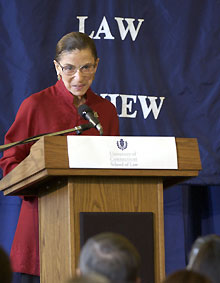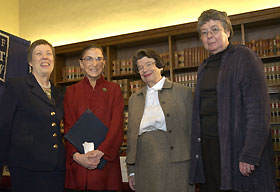For more archives, go to the Advance Archive/Search Page.
Ginsburg Gives Behind-The-Scenes
Glimpse Of Supreme Court
 |
Justice Ruth Bader Ginsburg speaks in Starr Hall at the School of Law. Photo by Peter Morenus
|
U.S. Supreme Court Justice Ruth Bader Ginsburg provided a glimpse into some behind-the-scenes customs that she contends help promote collegiality on the nation's highest court in an address at the School of Law last week.
Ginsburg, who gave this year's Day, Berry & Howard Visiting Scholar Lecture, also tackled topics ranging from the Court's recusal policy, to its reliance on foreign law in its own jurisprudence, to the voluminous files of the late Justice Harry Blackmun released by the Library of Congress earlier this month.
Speaking to a packed house of several hundred students, lawyers, judges, and academics in the Starr Reading Room, Ginsburg told how Blackmun - best known for having written the majority opinion in Roe v. Wade in 1973 - was a copious note-taker during oral arguments. "But his recollections were not always accurate," she said.
Elaborating, Ginsburg explained how Blackmun, writing about a case in which she appeared as counsel before the high court prior to her appointment as justice, recorded that she had come to court wearing a red dress.
"I always went to court wearing black," insisted the soft-spoken Ginsburg, "because I wanted the justices to concentrate on my argument."
The Brooklyn-born Ginsburg, who turns 71 this week, graduated from Cornell University and Columbia Law School. The first tenured female law professor at Columbia, she fought against sex-based discrimination in the early 1960's, when, for example, school teachers were forced to give up their jobs if they became pregnant. By the 1970's, she was arguing before the Supreme Court on gender stereotypes and the law.
Ginsburg's visit to UConn comes at a time when national attention is focused on ever-sharper partisan rhetoric and hardball political maneuvering as the 2004 presidential election gets underway. By contrast, Supreme Court justices, despite having sharp differences over certain legal issues, "remain good friends, people who respect each other and genuinely enjoy each other's company," Ginsburg said.
This is due, in part, she said, to the current court's longevity. The justices have served nearly 10 years together with no changes in their membership, noted Ginsburg, who was appointed to the bench in 1993 by President Bill Clinton. "It's the longest sitting bench since 1823," she said. The longest sitting Court was a six-member court that lasted from 1811 to 1823.
Describing her job as "the best work an American lawyer can have," Ginsburg said the work is "very hard, enormously time-consuming, and tremendously challenging."
 |
From left: Dean Nell Newton; Justice Ruth Bader Ginsburg; Ellen Ash Peters, former
Chief Justice of the Connecticut Supreme Court; and Carol Weisbrod, professor of law.
Justice Ginsburg donated her speaking fee to the Ellen Ash Peters endowed chair, currently held by Weisbrod.
Photo by Peter Morenus |
But, she added, "a lighter side of life in our marble palace exists," that promotes a collegial atmosphere among the court's members. For example, before each day's court session begins, as the justices gather in their robing room, they shake hands. On days they hear cases, they dine together in the Court's dining room.
Topics of lunch conversation vary from the performance of the lawyers to the exploits of the justices' grandchildren, Ginsburg said. Occasionally they invite guests to join them; recent invitees have included U.N. Secretary-General Kofi Annan, National Security Advisor Condoleezza Rice, and former Secretary of State Henry Kissinger.
"Federal Reserve Chairman Alan Greenspan has been our only repeat invitee," Ginsburg said, "because he has an uncanny ability to eat and speak at the same time."
When the high court's session of hearing cases ends, generally in April, yet before the intense work of writing decisions begins, Ginsburg said the justices and their spouses take advantage of 'this brief pause' to stage a musicale, a tradition begun by Blackmun in 1988.
Answering questions from the audience after her remarks, Ginsburg defended her decision not to recuse herself from a case involving the National Organization of Women Legal Defense and Education Fund, a women's advocacy group with which she is associated.
Ginsburg's involvement in a January lecture series organized by the group has been criticized because two weeks prior to the series, she took the side backed by the defense fund in a medical screening case.
Justice Scalia has also recently been criticized for conflict of interest, for taking a January duck hunting trip with Vice President Dick Cheney after the high court agreed to review a lower court ruling requiring the White House to identify members of the vice president's energy task force.
"Some believe that a recusal on the Supreme Court is the equivalent of a vote against the petitioner," said Ginsburg. "We won't lightly recuse ourselves."
Ginsburg also responded to another hot legal issue concerning the Supreme Court's explicit citation of foreign laws in its own decisions. In its most controversial decisions last year, the high court overturned legislation prohibiting homosexual conduct between consenting adults and upheld narrowly tailored affirmative action plans. In both these rulings, the Court made extraordinary reference to foreign law, indicating that international law will influence their view of American law.
Ginsburg, who joined the majority in both rulings, said "the use of comparative side glances is nothing new in the history of the U.S. judiciary. ... The Founding Fathers," she said, "looked all over for models of government they could adapt to our circumstances.
"No one suggests that foreign law would be binding on us," Ginsburg added, "but we have something to learn from the quality of reasoning on questions that confront us all."
Ginsburg's lecture was underwritten by the Day, Berry & Howard Foundation and presented in conjunction with the Connecticut Law Review, which will also publish an edited transcript of her presentation.
Ginsberg donated the honorarium for her lecture to the Ellen Ash Peters Endowed Professorship, which was established in 1989 by Phillip I. Blumberg, dean and professor of law and business emeritus, in honor of his wife, Ellen Ash Peters, the first woman to serve as Chief Justice of the Connecticut Supreme Court. Income from the fund is used to support a professor at the law school with scholarly interests principally in the area of contract or commercial law. Carol A. Weisbrod is currently the Ellen Ash Peters Professor of Law.

